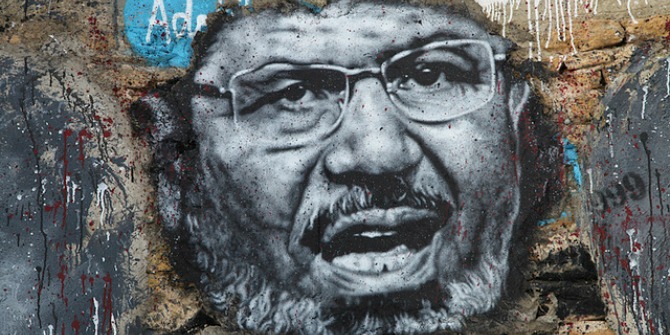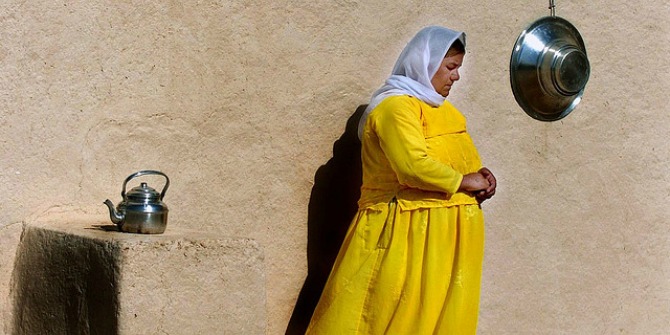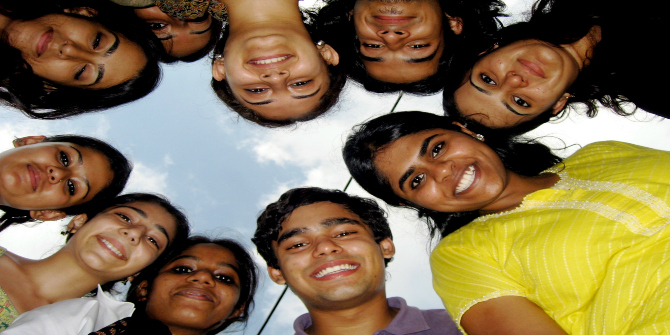Drawing on years of participant observation, interviews, previously inaccessible organizational documents, and memoirs and writings, Hazem Kandil aims to provide an intimate portrayal of the recruitment and socialization of the Muslim Brotherhood. Toygar Sinan Baykan recommends this read for the clarity of its narrative.
 Inside the Brotherhood. Hazem Kandil. Polity. 2015.
Inside the Brotherhood. Hazem Kandil. Polity. 2015.
The Muslim Brotherhood (MB) has been an enormously influential political movement in the Middle East, whether through its closely linked affiliates or by representing an organisational and ideological model for Islamists.
Despite the rich literature on the various aspects of the MB, Hazem Kandil’s Inside the Brotherhood, as its title suggests, contributes remarkably to our understanding of the inner ideological commitments and organisational dynamics of the brotherhood through its examination of MB instructions, dozens of memoirs by MB members and years of observing and participating in its activities and social networks. In addition, unlike other researchers, the author of the book has gained exceptional access to the “natural habitat” of MB members beyond their political activities (pp. 2-3).
From this privileged position Kandil has sought answers to the following questions: “Who are the Muslim Brothers? And what sort of relationship do they believe they have with the divine?” (p. 2). In order to answer these questions Kandil focuses on three related aspects of the MB’s politics. His research is an in-depth study of the cultivation of brothers, their interaction and “what goes on inside their head” (p. 4)
In the first chapter of the book, “Cultivating the brother”, Kandil demonstrates the peculiar recruitment processes and the long disciplining period preceding official membership of the organisation. As he underlines at the very beginning of the chapter, “one cannot choose to join the Muslim Brotherhood; one has to be chosen” (p. 5). According to him, this long probation and screening process, summed up as ‘cultivation’ (tarbiya), is not simply a matter of indoctrination but aims at “producing a new kind of person: the Muslim Brother” (p. 6). He stresses that this cultivation process has been central to the cohesion and tenacity of the MB; it has ensured that the Brotherhood in all its 85 years has experienced no major dissent. Kandil contends that the key element in producing its extraordinary resilience is its “anti-intellectualism”.
First of all, the MB has always prioritized sentiments and practice over enquiry. As al-Banna advised the brothers, they should “be practical not argumentative” (p. 19). Otherwise, the MB leadership believed that arguments would poison the peace between brothers (p. 19). The second component of the MB’s cultivation practice is the prevention of discord within the organisation through techniques of “pre-emption”, “disinformation”, “organisational pressure” and “marginalization” (pp. 22-28), which have inhibited any lively intellectual or ideological debate and deprived the MB of any public intellectuals (p. 26). This tendency has been consolidated by the dominance since the beginning of the 21st century of rural-provincial members in the MB cadres (pp. 31-2), the participation of fundamentalist (salafi) currents during the 1970s (pp. 32-33) and the strong leverage of the radical Qutbists segments within the organisation (pp. 33-34).
These structural developments have paved the way for the prevalence of a background of the natural sciences among the MB elite and the absence of “students of politics, sociology, history, and philosophy” among them (p. 34). Hence it was not surprising to read that al-Banna criticized students who do not study natural sciences but spend their time on “abstract philosophies and unproductive, fanciful sciences” (p. 38). But, Kandil maintains, once the MB came to power, the lack of social scientists and experts in politics, economics and administration among its cadres resulted in major practical problems in government (p. 46).
Yet the MB has convinced its members that the movement is sacred (p. 48). In addition, it seems that most of its members have started to conflate the brotherhood with Islam itself (p. 48). As one of the brothers commented on leaving the MB, the dissidents within it “are renouncing faith not an ideology; [they] are abandoning God not Hassan al-Banna” (p. 50). Hence, MB members experience their membership not as a political and ideological engagement but as a whole way of life and social existence (pp. 70-71). Drawing on its anti-intellectualism and through sanctifying its leaders and enhancing conspiratorial understandings among the members (pp. 53-70), the MB has further isolated its members from sound interaction with those outside the MB circle. Hence, leaving the organisation after a certain time among the MB social networks entails a huge cost: leaving all one’s meaningful social relations and functions (pp. 70-71); one of the tendencies of the MB is to provide an insulating social environment, most notably wives to the brothers from the ranks of an affiliated sisterhood (p. 74).
 Mohamed Morsi – Image credit: thierry ehrmann (CC BY)
Mohamed Morsi – Image credit: thierry ehrmann (CC BY)
After illustrating the recruitment processes and the extent of the social networks of the MB, Kandil demonstrates the essence of the MB ideology, namely “religious determinism” (p. 85). Given its members’ strong faith in the sacredness of the movement, its efforts to cultivate new Muslim subjects and its inward-looking organisational dynamics, the MB has produced a deterministic approach to politics which stems from a belief that, when certain historical, social and above all theological conditions are met – that is, when the MB has cultivated true Muslims in sufficient numbers – its victory, with no political intervention, will be inevitable. Hence, as Kandil illustrates in the fourth and the fifth chapters of the book, its anti-intellectualist, anti-argumentative and isolationist cultivation process, its inward-looking organisational culture and its strategically impotent mind-set prevented the MB from establishing alliances with the secular political actors of the Egyptian revolution; it suffered from the lack of competent cadres among its elite. The result was that this mighty movement, constructed over decades, fell within weeks of the events in Adawiya square while its members were still waiting for the divine intervention which would bring victory to the MB and Morsi.
Despite the clarity of the narrative in the very informative fifth chapter of the book, where Kandil evaluates different Islamist movements across the Middle East, a couple of minor mistakes were made in the part on Turkey and these should be corrected in future editions. Kandil argues that “In 2002, AKP became the first political party to govern without a coalition since the republic’s embrace of multiparty politics six decades before” (p.170). In fact, since the transition to multi-party politics, Turkey has seen long periods of single majority government, such as those of the Democrat Party from 1950 to 1960 and the Motherland Party from 1983 to 1991. It is also parenthetically suggested in italics that the Turkish equivalent of the term “intellectually able” is entelektüel mümkün (p.167) and of “neo-Ottomanism” is Osmanlicaler (p.171). In fact, the first expression means in Turkish entelektüel olarak yeterli/yetkin and the second expression translates as yeni Osmanlıcılık.
Kandil could also have shed more light on the nature of the highly restrictive Egyptian authoritarianism which has hardly been rewarding for the transformation of Islamist movements. He could have engaged, too, in wider definitional discussion and comparative scholarship on Islamism (and perhaps post-Islamism). Nevertheless, as he makes clear in his brief discussion on theory and method, he is mainly interested in showing how ideology constrains political actors (p. 179). Hence, he adopts an agency based theoretical approach and makes an invaluable contribution to our understanding of agency based obstructions to the transformation, adaptation and success of Islamist political actors.
Toygar Sinan Baykan is a PhD researcher in politics at the University of Sussex. He studied political science in the Faculty of Political Science, Ankara University. He also attended the Middle East Technical University and Leiden University for his graduate studies and has a master’s degree in comparative politics from LSE. His current research focuses on Islamist and post-Islamist politics and political organisations, in particular the organisation and strategies of the Justice and Development Party in Turkey. His research interests include party politics, comparative politics and political culture.








1 Comments